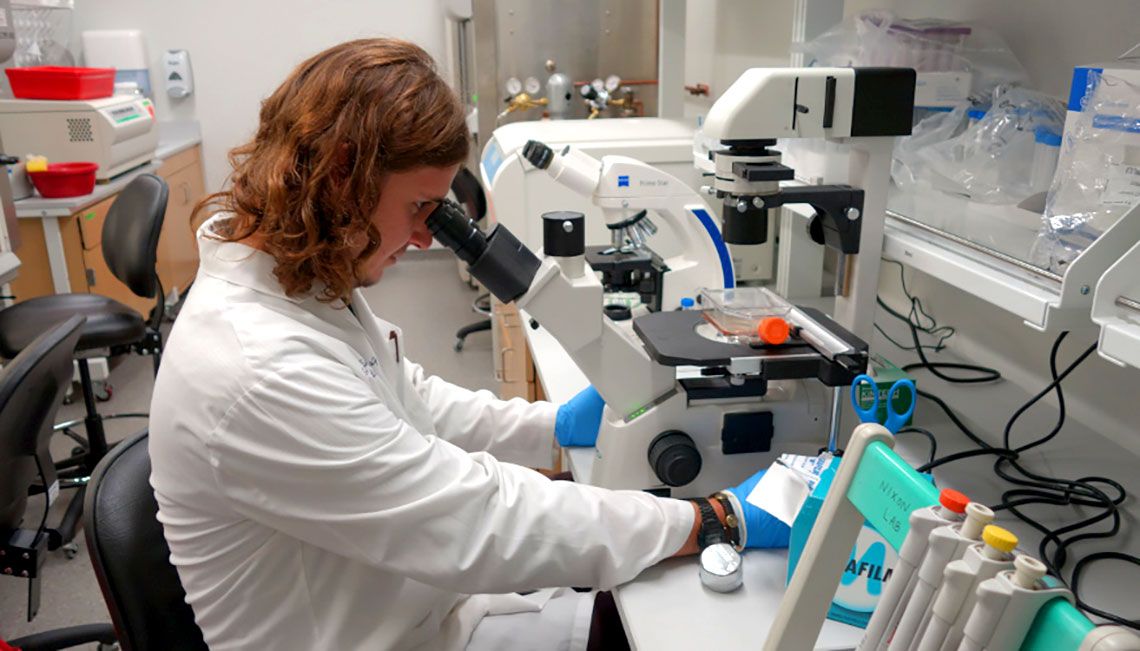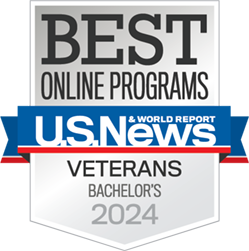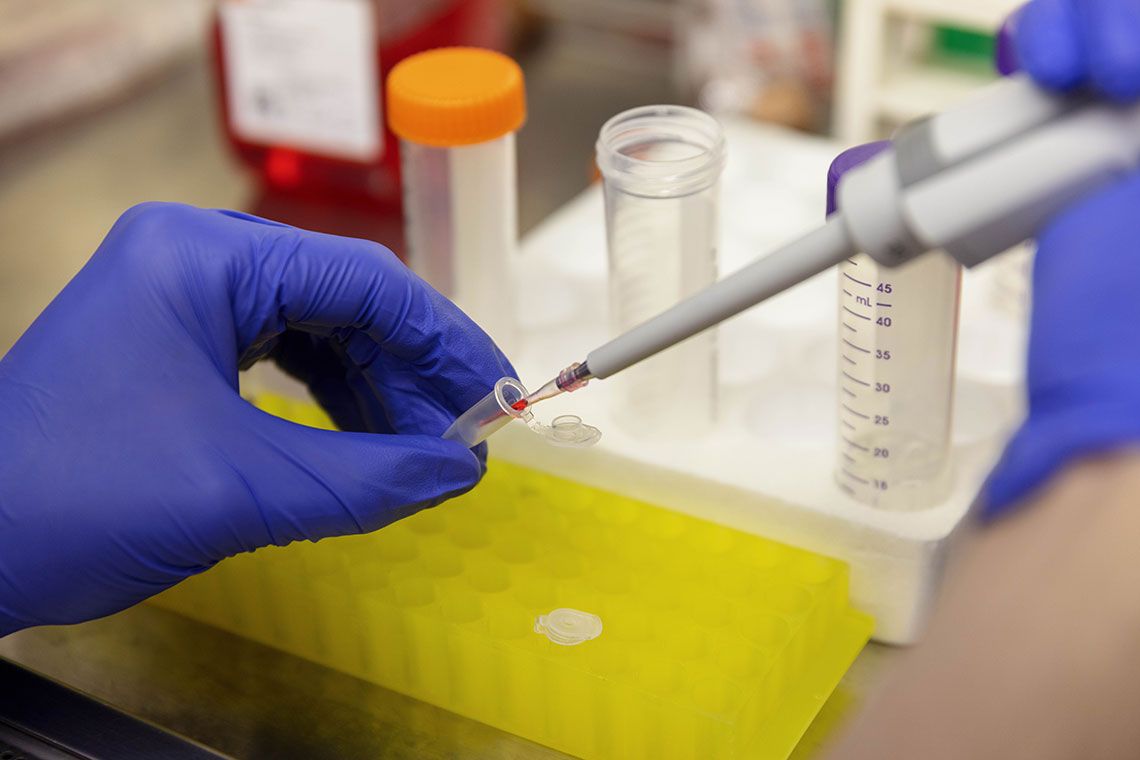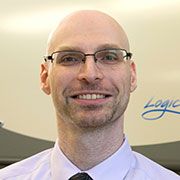
Hands-On Skills for the Medical Laboratory
Online Coursework
24 Months*
The George Washington University’s (GW) Master of Science in Health Sciences (MSHS) in Laboratory Medicine program is a clinical program designed to prepare you for a career in medical laboratory science. As one of the few Medical Laboratory Medicine graduate programs in the country that combines online coursework and a hands-on practicum, you will obtain the knowledge and experience you need to sit for the American Society for Clinical Pathology (ASCP) Medical Laboratory Scientist (MLS) board certification exam.*
To learn more about our programs, you can register for our upcoming events.
*The total number of credits and duration of the program depend on the number of transferred credits
Program Highlights
- 100% of students who enter Phase II of the MLS program graduate
- 90% Five year pass rate for GW grads in the ASCP MLS board of certification exam
- Greater than 95% of graduates are employed in the field within three months of program completion
- Applicants with clinical laboratory experience may be eligible to waive individual clinical practicum requirements
- Qualify to move into a lab supervisory, management, or teaching position
- Accredited by the National Accrediting Agency for Clinical Laboratory Sciences (NAACLS)
Request Information
* Indicates required field
- Read: Privacy Disclaimer Acknowledgment
-
By submitting your contact information, you are providing your express consent authorizing GW and GW's representatives to contact you by email, phone, or text (including the use of an automatic dialing system). Standard text messaging and/or data rates may apply.
If you do not provide your contact information (phone and email), we may not be able to provide you with the information you requested.
If you provided your contact information but no longer wish to receive phone calls, emails, or text (SMS) messages from GW, you will have the option to opt-out. Emails and Text messages will include details for unsubscribing/opting out. To opt out of receiving phone calls from GW, contact us via email at info [at] hsprograms [dot] gwu [dot] edu (info[at]hsprograms[dot]gwu[dot]edu) or text/ call: 202-792-2819.
By submitting your information via this form, you also confirm that you have read and understood the GW Statement of Privacy Practices.
Note that the consent requested above is not required for enrollment in GW's programs. If you do not consent to providing the information requested on this form, you may contact us via email at info [at] hsprograms [dot] gwu [dot] edu (info[at]hsprograms[dot]gwu[dot]edu) or text/ call: 202-792-2819.
Accreditation and Rankings
- GW is accredited by the Middle States Commission on Higher Education
- #62 Best National University*
- #13 Best Online Bachelor's Programs*
- #7 Best Online Programs for Veterans*
* The U.S. News & World Report – 2024 Rankings



Curriculum
The online MSHS in Laboratory Medicine is a 52-credit-hour program that leverages distinguished faculty, innovative curriculum, and real-world experience. You’ll acquire the comprehensive skills you need to succeed in the field of laboratory medicine.
Program Outcomes
When you complete this program, you'll be able to sit for the ASCP Board of Certification exam (Route 1) and be able to:
- Evaluate research to explain the relevance to the laboratory science field
- Investigate research questions pertinent to clinical laboratory
- Analyze new laboratory-related technologies and determine their relevance in the lab
- Implement a research study to improve and enhance the medical laboratory science field
- Communicate, both orally and in writing, in an effective and scholarly manner
- Integrate basic ethical principles and cultural sensitivity both in the professional and research setting
| GW MLS Graduation Rates:* | GW MLS Placement Rates:** |
|
ASCP National Overall Pass Rate: | |
|---|---|---|---|---|
| 2022: 99% | 100% | 87.34% | 68.71% | |
| 2023: 97% | 100% | 90% | 68.71% | |
| 2024: 97% | 100% | 87.72% | 69.53% |
*Students graduating that began the second half of the program.
**Students who found employment (in the field or in a closely related field) and/or continued their education within one year of graduation.
***Students who passed within the first year of graduation
†Not a final result; rate calculation currently in progress
Who Is the Ideal Student for This Program?
The MSHS in Laboratory Medicine program is designed to prepare individuals for a career as a medical laboratory scientist and who would like to qualify to sit for the ASCP Medical Laboratory Scientist (MLS) board certification exam.
Career Outlook
With U.S. Bureau of Labor Statistics projecting available jobs to increase 11% between 2018 and 2028, students will have the opportunity to pursue a career in a laboratory setting like diagnostic laboratories, research institutions, public health laboratories, biotechnology firms, pharmaceutical companies, and government agencies. Career titles include:
- Clinical Laboratory Scientist
- Clinical Laboratory Supervisor
- MLT/MLS Education position
- Biotechnology or Government Research Associate
Admission Requirements
To be accepted to this program, you must have:
| Completed application |
| 3.0 GPA or above on a 4.0 scale |
| A bachelor’s degree in a basic or medical science (e.g. Biology, Chemistry, Microbiology) from a regionally accredited institution. |
| Resume/CV |
| Personal statement: Applicants must include a 250–500 word essay describing your reasons for undertaking study at GW, your academic objectives, career goals, and related qualifications including collegiate, professional, and community activities relevant to your program of interest. Include any substantial accomplishments not already mentioned on the application form. |
| Two letters of recommendation |
Tuition Details
The MSHS in Laboratory Medicine program at GW consists of 52 credit hours. Explore the cost per credit hour and total estimated program costs.
Note: Tuition rates are subject to change and additional fees may vary by program.
Meet the Program Director

GW’s experienced faculty provide you with the rich, practical knowledge and support needed for you to succeed in the program and in your career.
Cliff Cymrot, DHSc, MHA, MLS(ASCP)CM, SHCM, MT(AAB), MT(AMT)
- Read Full Bio
-
Dr. Cliff Cymrot is the current Program Director for Medical Laboratory Sciences (MLS) and has over 10 years of experience in combined teaching and clinical laboratory practice. In addition to his program director duties, Dr. Cymrot teaches a range of courses within the MLS program, both online and face-to-face, such as Hematology lecture and lab, Bacteriology lab, Immunohematology lab, and Molecular Diagnostics, and Capstone.
Prior to his arrival at George Washington University (GW), Dr. Cymrot worked as a medical laboratory technician at a medium-sized, 200-bed hospital in upstate NY. In 2008, Dr. Cymrot worked for Advance Magazine for Laboratory Professionals providing storylines for the comic strip “Lab out Loud” that he worked on with his brother-in-law. He has also been a contributor for several chapters in the Textbook of Diagnostic Microbiology by Mahon, Lehman, and Manuselis, as well as having various research publications.
He is also a member of the DC chapter for the American Society for Clinical Laboratory Science (ASCLS), American Medical Technologists (AMT), and the American Association of Bioanalysts (AAB). He also holds certifications in ASCP, AMT, and AAB in Medical Laboratory Science, and Specialist in Hematology.
In 2010, he earned his B.S. in Medical Technology from the University of Cincinnati (UC). He was then promoted to medical laboratory scientist and soon after began working as an adjunct instructor for SUNY Orange teaching Microbiology for Health Professionals, Fundamentals of Anatomy and Physiology, and Certification Preparation. In 2014 he earned his a master’s degree in Health Administration from UC.
After graduation, he received an offer to facilitate an online graduate level course in health systems management at UC. In 2015 he was offered a position at GW to teach all of the laboratory courses in the newly created BSHS in MLS blended/hybrid program. After three years he was offered the Program Director position for the undergraduate MLS program here at GW. In 2022 he then went on to complete his doctorate in health sciences at GW. In 2024 he was offered the Program Director position for the MSHS in Laboratory Medicine program here at GW. Dr. Cymrot is actively involved in the MLS profession and loves teaching, research, and promoting MLS.
State Licensure Information
A number of states in the US require licensure to practice as an MLS and each state that has licensure may have different requirements. Most states with licensure require graduating from a NAACLS accredited MLS program (such as the GW MLS program), passing the MLS certification exam (such as ASCP), and registering with your state. Each student is encouraged to contact their state’s regulating agency and review these requirements prior to beginning any degree program.
In particular, California requires a longer clinical rotation than what is included in our program of study. Individuals from CA are allowed to extend their clinical rotations as long as the clinical facility approves, in order to meet the CA licensure requirement. Extending your clinical rotations should be discussed with your clinical site and clinical coordinator as soon as possible once admitted to the program to ensure uninterrupted progression in your program of study. All graduates from our program that have extended their clinical rotation and have applied for licensure have successfully obtained a CA license.
NAACLS Program Accreditation
The Medical Laboratory Science Program is accredited by the National Accrediting Agency for Clinical Laboratory Sciences (NAACLS).
NAACLS
5600 N. River Rd., Suite 720
Rosemont, IL 60018-5119
847.939.3597, 773.714.8880, 773.714.8886 (fax)
Email: info [at] naacls [dot] org (info[at]naacls[dot]org)
Website: www.naacls.org
Curriculum Details
52 TOTAL CREDITS REQUIRED
The MSHS in Laboratory Medicine is a 52-credit-hour program with online coursework that leverages distinguished faculty, innovative curriculum, and real-world experience. You’ll acquire the comprehensive skills you need to succeed in the field of laboratory medicine.
Core
- HSCI 6263 Biostatistics for Clinical and Translational Research (3)
-
Basic concepts and methods of biostatistics applied to translational research. Topics include distributions, populations and sample selection, variables, interaction and confounding, hypothesis formulation, correlation, t-tests, ANOVA, regression, and chi.
- MLS 6116 Advanced Clinical Bacteriology I (3)
-
This course covers the pathogenic characteristics, isolation techniques, specimen collection and handling, laboratory identification, and treatment of medically significant bacteria and viruses with an emphasis on current diagnostic techniques used in clinical practice.
- MLS 6117 Advanced Clinical Bacteriology II (2)
-
This course presents the etiology of infectious diseases in different body sites using a case-study‐based approach It emphasizes the epidemiology, pathogenic mechanisms, and laboratory identification of suspected etiologic agents. Commonly encountered clinical species will be discussed using case studies that include clinical history, signs and symptoms, and laboratory test results of diseases produced by the etiologic agents.
- MLS 6119 Advanced Parasitology, Mycology, and Virology (2)
-
This course is designed to provide the student with a systematic approach to the biology and epidemiology of human parasitic, fungal and viral diseases. The course will cover the symptomology, pathology, diagnostic procedures and treatment of the various parasites, fungi and viruses that infect humans. Other topics including disease causation and specimen collection/handling will be discussed.
- MLS 6130 Advanced Hematology I (3)
-
This course covers all aspects of blood and blood-forming tissues with emphasis on hematologic techniques and cell identification. Anemias and non-malignant leukocyte disorders are also presented.
- MLS 6131 Advanced Hematology II (3)
-
This course focuses on hematopoiesis and hemostatic disorders.
- MLS 6141 Advanced Immunology and Serology (3)
-
This course covers the principles of the immune system and the clinical applications of immunology related to the diagnosis of human diseases. The first half of the course will focus on the components of the immune system and the various functions of each.
- MLS 6145 Advanced Clinical Biochemistry I (3)
-
This course covers the methodologies employed in the chemical analysis of human blood and body fluids and the associated pathophysiology of each analyte measured. Topics include the measurement of carbohydrates, proteins, lipids, and clinically significant enzymes.
- MLS 6146 Advanced Clinical Biochemistry II (3)
-
This course covers the methodologies employed in the chemical analysis of human blood and body fluids and the associated pathophysiology of each analyte measured. Topics include the measurement of hormones, urinalysis and body fluids, biomarkers, and toxins.
- MLS 6150 Advanced Immunohematology (3)
-
This course covers the blood group systems that impact the practice of transfusion medicine and examines the processing and distribution of blood products supplied by blood donor centers and transfusion services.
- MLS 6151 Advanced Molecular Diagnostics (3)
-
The advances in scientific technology have expanded the interest and applicability of nucleic acid based analysis within clinical diagnostic laboratories and routine screening procedures. This course provides an overview of molecular biology and genetic concepts as well as the molecular techniques used to diagnose human diseases. The course will emphasize the technology, theory, and methodology of specific molecular protocols that can be utilized within a clinical and research laboratory setting to aid in disease diagnosis, including those of genetic, oncogenic, and infectious origin.
- MLS 6158 Advanced Laboratory Management and Operations (3)
-
An introduction to critical concepts of lab management, including leadership theory, management principles, human resource management, financial management, quality management, and laboratory operations.
- MLS 6244 Research Ethics and Integrity (3)
-
Traditional and modern topics in research ethics and scientific integrity Students will learn to conduct unbiased peer-review, conduct research, and report on an independent case examinations, research misconduct or other ethical issues, and participate in oral scientific and ethical discussions.
- MLS 6245 Current Topics in MLS (3)
-
Exploration of findings within the medical laboratory science field. Current topics will be integrated into the development of a required project proposal for the capstone research project that the student will complete in the following semester.
- MLS 6246 Capstone Project (3)
-
Students apply the knowledge gained throughout the program to complete an independent, mentored project. A proposal for the capstone project will have been developed by the student as a component of the Current Topics in MLS course (MLS 6245) during the previous semester.
- MLS 6247 Advanced Clinical Biochemistry Practicum (2)
-
During this practicum course, the student will actively engage in applying the medical knowledge and clinical skills gained in the didactic Advanced Clinical Biochemistry I and Advanced Clinical Biochemistry II courses.
- MLS 6248 Advanced Blood Bank Practicum (2)
-
During this practicum course, the student will actively engage in applying the medical knowledge and clinical skills gained in the didactic Immunohematology course.
- MLS 6249 Advanced Coagulation Practicum (1)
-
During this practicum course, the student will actively engage in applying the medical knowledge and clinical skills gained in the didactic Advanced Hematology and Advanced Hematology II courses.
- MLS 6250 Advanced Hematology Practicum (1)
-
During this practicum course, the student will actively engage in applying the medical knowledge and clinical skills gained in the didactic Advanced Hematology I and Advanced Hematology II courses.
- MLS 6251 Advanced Clinical Microbiology Practicum (2)
-
During this practicum course, the student will actively engage in applying the medical knowledge and clinical skills gained in the didactic Advanced Clinical Bacteriology I, Advanced Clinical Bacteriology II, and Advanced Parasitology, Mycology and Virology courses.
- MLS 6252 Advanced Urinalysis Practicum (1)
-
During this practicum course, the student will actively engage in applying the medical knowledge and clinical skills gained in the didactic course materials.
Key Dates
|
Summer 2026 |
Fall 2026 |
Spring 2026 |
|
| Application Deadline |
March 20, 2026 (Open) |
July 20, 2026 (Open) |
November 19, 2025 (Closed) |
Admissions Requirements
To apply for the MSHS in Laboratory Medicine program (online coursework), you’ll need:
| Completed application |
| 3.0 GPA or above on a 4.0 scale |
| Bachelor’s degree from an accredited college or university. |
| Clinical practicum site |
| Resume/CV |
| Personal statement: Applicants must include a 250–500 word essay describing your reasons for undertaking study at GW, your academic objectives, career goals and related qualifications including collegiate, professional, and community activities relevant to your program of interest. Include any substantial accomplishments not already mentioned on the application form. |
| Official transcripts from every college and university attended. All non-U.S. transcripts (including those in English) must be evaluated by an accredited foreign credential agency. Please find the list of member organizations here: https://www.naces.org/members. |
|
Two letters of recommendation Letters of recommendation should be from:
Recommender will submit a letter on letterhead with a signature and credentials/contact information via the application portal. |
| Students must have the following prerequisite coursework with a C grade or higher: 3 credits English; 3 credits of college mathematics (algebra, statistics, or higher); 8 credits of general biology with hands-on lab; 8 credits general or inorganic chemistry with hands-on lab; 4 credits microbiology with hands-on lab; 3 credits organic or biochemistry. Please be prepared to provide unofficial transcripts to determine program admissibility. |
| Application fee: A non-refundable application fee of $80 is required. The application fee is waived for active-duty U.S. military, current GW students, degree-holding GW alumni, current McNair Program Scholars, and graduates of minority-serving institutions (MSI). |
| Students who live outside of the Washington, D.C., metro area are required to secure a satisfactory clinical site at the time of admission. |
| Review the Criminal Background Check and Drug Screening Policies in the Health Sciences Programs Bulletin |
|
Post Matriculation Requirements: Prior to Clinical Rotations: |
NOTE: This program is authorized, exempt, or not subject to state regulatory compliance and may enroll students from all 50 states, U.S. territories and the District of Columbia.
International Students
Effective Fall 2025
International students should check with individual programs regarding eligibility for visa sponsorship. Generally, online and hybrid programs are not eligible for student visa sponsorship from GW. This would include transfer students from any other institution with an existing visa. To be considered for admission, there are required scores that you will need to meet. Score requirements may differ by school and program so check the admissions requirements for your program.
Applicants who have not completed a post-secondary degree from an institution where English is the sole language of instruction are required to submit TOEFL, IELTS, PTE Academic, or the Duolingo English Test scores to be considered for admission. The following are the minimum scores for admission consideration:
- TOEFL: 600 on paper based, 250 on computer-based, or 100 Internet-based,
- PTE: overall score of 68,
- IELTS: an overall band score of 7.0, with no individual band score below 6.0
- DET overall score of 120.
Undergraduate applicants who meet one of the following conditions may be considered for admission without submitting TOEFL, PTE or IELTS or DET scores:
- You have earned an associate’s degree or higher from an institution where English is the sole language of instruction
- You are a citizen of an English-speaking country
Scores may not be more than two years old. To ensure TOEFL scores are sent to GW, use institutional code 5246. An institutional code is not required to send IELTS or PTE scores to GW. DET scores must be submitted via the Duolingo English Test system directly to GW.
Based on the results of your English Proficiency exam results and your application, you may be required to take English for Academic Purposes (EAP) during your first year of study at GW. Please note that GW evaluates each application holistically so applicants may still be recommended for EAP even if they meet the requirements for exemption. Students placed in EAP courses should anticipate additional tuition expenses as well as possible extension of time needed to complete their degree programs.
Official transcripts from institutions outside the U.S. must be accompanied by an official transcript evaluation from an accredited independent evaluating agency. Please be sure you request a detailed evaluation that includes all course titles, credit hours, grades, U.S. degree equivalency, grade-point averages (GPA), and date of degree conferral (course by course evaluation). For a list of acceptable foreign credential evaluation services, please visit NACES.
Supporting documents not submitted online should be mailed to:
Mail: George Washington University
ATTN: Transcript Processing Center
1415 W 22nd St.
Suite 220
Oak Brook, IL 60523
Alternatively, official electronic transcripts can be sent to: transcripts [at] hsprograms [dot] gwu [dot] edu (transcripts[at]hsprograms[dot]gwu[dot]edu)